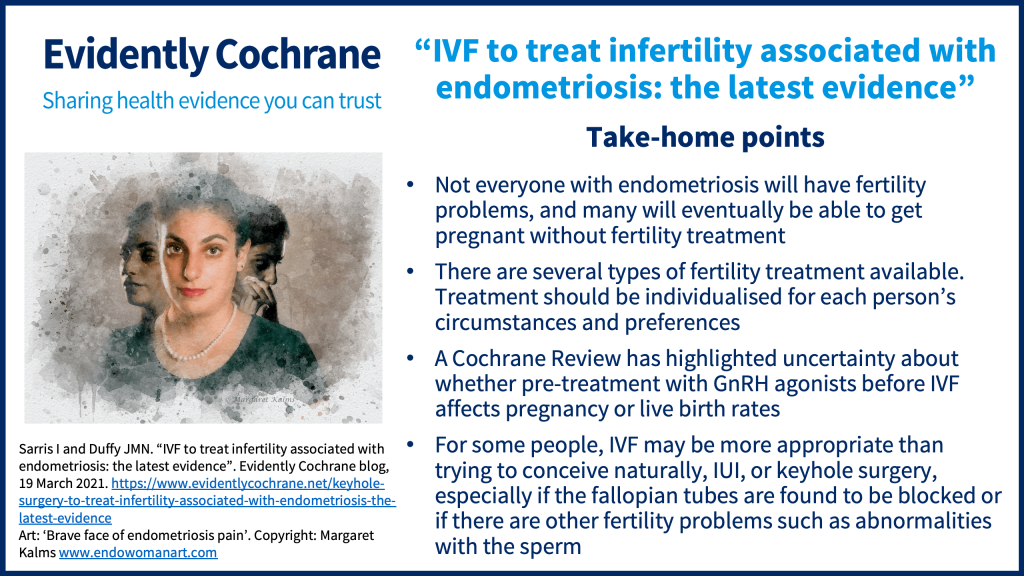In this blog for people with endometriosis, Dr Ippokratis Sarris, Consultant in Reproductive Medicine and the Director of King’s Fertility, and Dr James Duffy, Clinical Fellow at King’s Fertility, discuss the reasons why endometriosis causes fertility problems, potential treatmentSomething done with the aim of improving health or relieving suffering. For example, medicines, surgery, psychological and physical therapies, diet and exercise changes. options, and the latest Cochrane evidenceCochrane Reviews are systematic reviews. In systematic reviews we search for and summarize studies that answer a specific research question (e.g. is paracetamol effective and safe for treating back pain?). The studies are identified, assessed, and summarized by using a systematic and predefined approach. They inform recommendations for healthcare and research. on IVF for endometriosis.
This blog is the fifth in our #MyEndometriosisQuestion series running throughout March, with blogs about endometriosis and an invitation to ask your questions, which will be addressed by a panel of experts. More details at the end of this blog.
Featured image: ‘Brave face of endometriosis pain’ by Margaret Kalms* http://www.endowomanart.com
Page last checked July 2023

What is endometriosis?
In the video below, Dr Kuhan Rajah explains what endometriosis is. Dr Rajah is a consultant obstetrician and a sub-specialist in reproductive medicine at King’s Fertility. His areas of expertise are gynaecological and early pregnancy ultrasound, minimally invasive surgery, and all aspects of fertility medicine.
.
Why does endometriosis cause fertility problems?
.
.
It is not fully understood why it may be more difficult for some people with endometriosis to become pregnant. Depending on the severity of the endometriosis, between 30% to 50% of people with endometriosis may experience fertility problems. Endometriosis can influence fertility in several ways:
- distorted anatomy of the pelvis
- adhesions (bands of scar-like tissue)
- damage to the fallopian tubes or ovaries
- inflammation of the pelvic structures
- altered immune system functioning
- changes in the hormonal environment of the eggs
- impaired implantation of a pregnancy
- altered egg quality
The exact nature of the link between fertility problems and endometriosis is unclear but the severity of the condition and location of the tissue appears to have an effect. It is not fully known why and how mild endometriosis affects the chances of getting pregnant. But people with severe endometriosis, which causes considerable scarring, blocked fallopian tubes, and damaged ovaries, experience the most difficulty becoming pregnant and often require Assisted Reproductive Techniques (ART) treatment, including in-vitro fertilisation (IVF). However, even with severe endometriosis natural conception is still possible.
It is also important to remember that not all people with endometriosis will have problems, and many will eventually be able to get pregnant without treatment.
What are my treatment options?
.
.
There is no such thing as ‘the best fertility treatment’. There are several types of fertility treatment available. What type of fertility treatment you might want to pursue depends on the severity of endometriosis, your age, other medical conditions, past pregnancies, and whether there are other identified fertility problems such as blocked tubes or sperm problems. Your preferences, for example, continuing trying to conceive without fertility treatment or favouring a less invasive fertility treatment, and circumstances, for example, your individual work circumstances or family and carer obligations, should be considered when developing a treatment plan.
Medical treatments
Currently, there is no evidence that taking medicines can improve a person’s chances of getting pregnant.
Keyhole surgery
One treatment option is keyhole surgery which aims to remove deposits of endometriosis and scar tissue from the surface of the womb, fallopian tubes, and ovaries. This is a popular treatment choice for women with infertility associated with endometriosis.
James was part of the research team which prepared a systematic reviewIn systematic reviews we search for and summarize studies that answer a specific research question (e.g. is paracetamol effective and safe for treating back pain?). The studies are identified, assessed, and summarized by using a systematic and predefined approach. They inform recommendations for healthcare and research., Laparoscopic surgery for endometriosis, published in October 2020, on behalf of the Cochrane Gynaecology and Fertility Group. They brought together the evidence from all published research studies evaluating keyhole surgery for the treatment of infertility associated with endometriosis. After systematically reviewing the evidence, they concluded there was moderate-certaintyThe certainty (or quality) of evidence is the extent to which we can be confident that what the research tells us about a particular treatment effect is likely to be accurate. Concerns about factors such as bias can reduce the certainty of the evidence. Evidence may be of high certainty; moderate certainty; low certainty or very-low certainty. Cochrane has adopted the GRADE approach (Grading of Recommendations Assessment, Development and Evaluation) for assessing certainty (or quality) of evidence. Find out more here: https://training.cochrane.org/grade-approach evidence that laparoscopic surgery probably increases pregnancy rates compared to diagnostic laparoscopy in women with mild to moderate endometriosis. Unfortunately, there was insufficient evidence concerning adverse events to allow them to draw any conclusions regarding safetyRefers to serious adverse effects, such as those that threaten life, require or prolong hospitalization, result in permanent disability, or cause birth defects..
Unfortunately, there is currently no high-quality evidence comparing surgery before IVF or comparing keyhole surgery with IVF directly.
You can read more in the Evidently Cochrane blog Keyhole surgery to treat infertility associated with endometriosis: the latest evidence.
Assisted reproductive techniques (ART)
ART treatments, such as Intrauterine Insemination (IUI) or In Vitro Fertilisation (IVF) are established treatments for endometriosis-related infertility.
Intrauterine Insemination (IUI)
Taking into account the available evidence and our experience, we tend to recommend that IUI is only suitable for milder forms of endometriosis (stage I-II) and for women that have normal fallopian tubes and whose partner’s sperm is of sufficiently good quality. In order to improve the likelihood of pregnancy, fertility medication can be used to mildly stimulate the ovaries. Around the time that the egg is released from the ovary (ovulation), a sperm sample is processed in the laboratory. The sperm is then placed into the womb with a thin tube. This is done using a speculum, which is the same instrument which is used when performing a smear test. IUI is currently not recommended routinely by NICE, although it is still widely used throughout the world.
In Vitro Fertilisation (IVF)
IVF is a process of collecting eggs from a woman’s ovaries, fertilising them with sperm (her partner’s or donor sperm), to create embryos and then replacing the embryos in her womb. Donor eggs and sperm can also be used for IVF.
Cochrane evidence regarding pre-treatment before IVF
One treatment option is to treat people with endometriosis with gonadotrophin‐releasing hormone (GnRH) agonist medication for a period of three to six months prior to in IVF. This is a modified version of a naturally occurring hormone known as gonadotropin releasing hormone. Through its effect, it stops the activity of the ovaries and consequently the production of oestrogen. This is thought to cause regression of the endometriosis and could be effective in improving fertility. Practice varies across the world and GnRH agonist medication prior to IVF is sometimes offered, as colleagues believe it could be effective in improving pregnancy and live birth rates.
A research team has prepared a systematic review, Long‐term GnRH agonist therapy before in vitro fertilisation (IVF) for improving fertility outcomes in women with endometriosis, published in November 2019, on behalf of the Cochrane Gynaecology and Fertility Group. They brought together the evidence from all published research studies evaluating a minimum of three months of GnRH agonist therapy before IVF. They included research studies that randomly allocated women with infertility associated with endometriosis to undergo GnRH agonist therapy before IVF or no pre-treatment. They identified eight research studies which included 640 women. There were no studies comparing long-term GnRH agonist therapy with other types of pretreatment.
After systematically reviewing the evidence, they were uncertain whether pre-treatment with GnRH agonist before IVF affected the pregnancy or live birth rates. Currently, the evidence is also very uncertain about the likelihood that people may experience complications of GnRH agonist therapy.
The main limitations in the evidence were lack of blindingBlinding is the process of preventing those involved in a trial from knowing to which comparison group a particular participant belongs. (the process where the women participating in the trialClinical trials are research studies involving people who use healthcare services. They often compare a new or different treatment with the best treatment currently available. This is to test whether the new or different treatment is safe, effective and any better than what is currently used. No matter how promising a new treatment may appear during tests in a laboratory, it must go through clinical trials before its benefits and risks can really be known., as well as the research staff, are not aware of the medication used), inconsistency (differences between different studies), and imprecision (small size of each studyAn investigation of a healthcare problem. There are different types of studies used to answer research questions, for example randomised controlled trials or observational studies.).
This is disappointing because although we think medical or surgical treatment of endometriosis before IVF has the potential to improve pregnancy and live birth rates, reliable evidence on its effectivenessThe ability of an intervention (for example a drug, surgery, or exercise) to produce a desired effect, such as reduce symptoms. and safety would better inform decisions about treatment. Further high-quality research is urgently required.
Role of IVF
Assuming that other factors, such as semen quality, fallopian tubes, and ovulation, are normal then NICE recommends that IVF is offered to women with endometriosis after two years of trying for a baby unsuccessfully.
Taking into account the available evidence and our experience, we tend to recommend that, some people with endometriosis go straight to fertility treatment with IVF. For example, if pregnancy does not occur within six to 12 months after surgical treatment of endometriosis, if the fallopian tubes are found to be blocked, or if there are other fertility problems such as abnormalities with the sperm.
Questions to ask your fertility specialist
- What are my fertility treatment options?
- What are the chances of success?
- What are the risks?
- What are the chances of me becoming pregnant if I do not seek fertility treatment?
- Should I consider having keyhole surgery before embarking on IVF treatment?
- How will keyhole surgery affect my egg count (ovarian reserve) and future fertility potential?
More about #MyEndometriosisQuestion – and ask yours
You can find out more in the blog Endometriosis: #MyEndometriosisQuestion – a special series, including how to ask your question on our social media platforms, or you can post your question below this blog. While our experts cannot give specific medical advice, they can provide information about endometriosis, relevant evidence and guidelines, and tips for discussing endometriosis with your own health professional. Our expert panel will do their best to answer your questions individually. They will also reflect on some of the submitted questions in a blog to be published at the end of the month. No individuals will be named or identified in this blog.
Support for people with fertility problems
There is an online community of people with fertility problems who share knowledge and offer support. There are also charities such as Fertility Network UK, Fertility Europe, and RESOLVE: The National Infertility Association, and grassroots organisations such as Fair Treatment for the Women of Wales.
Support for people with endometriosis
There is a vibrant online community of women with endometriosis, commonly known as #endosisters, who share knowledge and offer support, along with charities such as Endometriosis UK and grassroots organisations such as Fair Treatment for the Women of Wales.
Further information about endometriosis
- Cochrane Gynaecology and Fertility: Endometriosis Awareness Month
- Endometriosis UK
- King’s Fertility: What is endometriosis?
- The British Society for Gynaecological Endoscopy (BGSE) maintains a list of accredited endometriosis centres.
- Fertility Network UK
- Fertility Europe
- Resolve
Join in the conversation on Twitter with @KingsFertility @JamesMNDuffy @CochraneUK and @CochraneCGF or leave a comment on the blog. Comments are checked by the Editors before they are made public on the blog.
Please note, we cannot give specific medical advice and do not publish comments that link to individual pages requesting donations or to commercial sites, or appear to endorse commercial products. We welcome diverse views and encourage discussion but we ask that comments are respectful and reserve the right to not publish any we consider offensive. Cochrane UK does not fact check – or endorse – readers’ comments, including any treatments mentioned.
Ippokratis Sarris and James Duffy have nothing to disclose.
References and further reading (pdf)
*Image used with permission and cannot be reused without permission from the artist.




How can i be preginant with endometrosis
This is a great article on treatment of IVF, Nice piece of information you have shared with us. You’re doing a great job and Thanks for sharing.
I have just finished my first round of ivf which has ended with a pelvic infection, I’m told now that as I had an endometrium on an ovary this put me at high risk of infection. The first I heard about the endometrium was at my 8 day scan after starting Menopur. I wasntold i had 8 good folicles and to do the trigger that evening. At egg collection there were only 3 eggs, due to the endometrium many folicles were filled with blood. I was given a dose of antibiotics at egg collection to prevet infection but this didnt work. I then had an embryo transfer 3 days later. 8 days after that i started bleeding heavily despite taking Lubion injections, by the evening i had a bit of a fever which got a bit worse overnight. Sunday morning i caĺled the emergency line and was advised to go to A&E as they suspected an infection. My bloods were taken – my HGC was in the negative confirming i was not pregnant, my inflammation markers we up showing an infection. By Tuesday i had a lot of pain in my whole stomach, my gp prescribed me 2 lots of antibiotics for 5 days. The following Monday i was seen at my ACU and a scan and exam was done along with bloods. I was put on 3 lots of antibiotics for 7 days.
I have never been diagnosed with endometriosis or suffered from any symptoms previously. Is it normal to get an endometrium in these circumstances? Does this mean I have endometriosis now?
The Menopur instructions say you shouldn’t take it if you have an ovarian cyst – should I have been put on it?
If I was at high risk of infection should embryo transfer have gone ahead on day 3? Note I only had 2 embryos and both were put in.
I appreciate you don’t have any oversight of my particulars and medical history so any answers are probably more general assumptions, but I’m really struggling to work out what has happened to land me here, I had no idea this was a risk. Thank you.